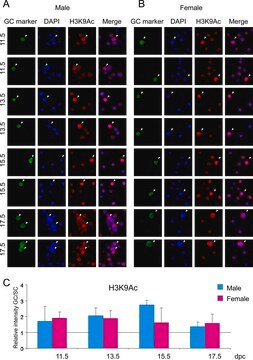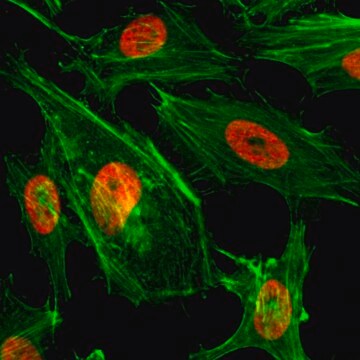07-030
Anti-dimethyl-Histone H3 (Lys4) Antibody
Upstate®, from rabbit
Synonym(s):
H3K4me2, Histone H3 (di methyl K4), H3 histone family, member T, histone 3, H3, histone cluster 3, H3
About This Item
Recommended Products
biological source
rabbit
Quality Level
antibody form
unpurified
antibody product type
primary antibodies
clone
polyclonal
species reactivity
Tetrahymena sp., human
manufacturer/tradename
Upstate®
technique(s)
ChIP: suitable (ChIP-seq)
dot blot: suitable
immunocytochemistry: suitable
immunofluorescence: suitable
inhibition assay: suitable (peptide)
western blot: suitable
NCBI accession no.
UniProt accession no.
shipped in
dry ice
target post-translational modification
dimethylation (Lys4)
Gene Information
human ... H3C1(8350)
General description
Specificity
Immunogen
Application
5 μL of a previous lot immunoprecipitated methylated Histone H3 from 1 x 106 3T3/A31 cells.
Immunocytochemistry:
1:500 dilution of a previous lot showed positive immunostaining for methylated Histone H3 in L6 cells fixed with 4% paraformaldehyde and permeabilized using 0.1% Triton X-100.
Epigenetics & Nuclear Function
Histones
Quality
Western Blot Analysis: 1:2000-1:10,000 dilution of this antibody detected methylated Histone H3 in acid extracted proteins from HeLa cells.
1:2000-1:5000 dilution of a previous lot detected methylated Histone H3 in acid extracted proteins from HeLa and tetrahymena cells.
Target description
Physical form
Storage and Stability
Handling Recommendations: Upon first thaw, and prior to removing the cap, centrifuge the vial and gently mix the solution. Aliquot into microcentrifuge tubes and store at -20°C. Avoid repeated freeze/thaw cycles, which may damage IgG and affect product performance.
Analysis Note
HeLa acid extract
Legal Information
Disclaimer
Not finding the right product?
Try our Product Selector Tool.
Storage Class Code
10 - Combustible liquids
WGK
WGK 1
Certificates of Analysis (COA)
Search for Certificates of Analysis (COA) by entering the products Lot/Batch Number. Lot and Batch Numbers can be found on a product’s label following the words ‘Lot’ or ‘Batch’.
Already Own This Product?
Find documentation for the products that you have recently purchased in the Document Library.
Customers Also Viewed
Our team of scientists has experience in all areas of research including Life Science, Material Science, Chemical Synthesis, Chromatography, Analytical and many others.
Contact Technical Service









